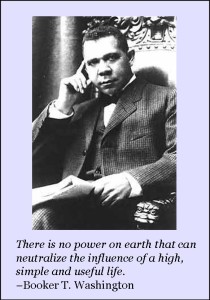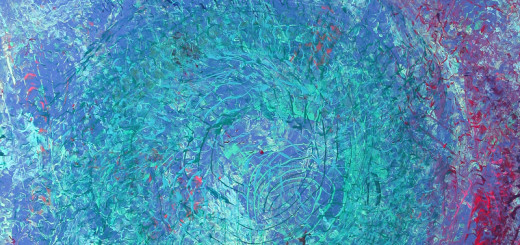Embrace Chaos and Work With It
“You can’t hold a man down without staying down with him.” –Booker T. Washington
 In sixth grade, I learned about Booker T. Washington. Apparently, he was a freed slave who worked hard to gain an education and then rose to become an influential figure in his day. His passion for education led him to become involved in the founding of the Tuskegee Institute in Alabama. I’d say this is a guy who should know something about oppression and empowerment.
In sixth grade, I learned about Booker T. Washington. Apparently, he was a freed slave who worked hard to gain an education and then rose to become an influential figure in his day. His passion for education led him to become involved in the founding of the Tuskegee Institute in Alabama. I’d say this is a guy who should know something about oppression and empowerment.
While we no longer have slavery in this nation, I wonder how many of us still practice oppression when we hold ourselves as well as others back from the empowerment that comes with change… whether it’s social change or personal change.
Don’t get me wrong. I’m not being all high and mighty here. I’ve done it too – even if it was just putting a wet blanket on the fire of someone else’s ideas. Not to mention all the times I let my inner critic call the shots and hold me down in a dark place. What I’m saying is that we sometimes get so caught up in our expectations of how things are supposed to be, we end up stifling the personal growth that must come forth in ourselves as well as in others. We even do this to those we hold most dear. Why do we want to hold ourselves and others down like this? What are we afraid of?
Change is inevitable. The universe and all its bodies, atoms, and molecules are in constant motion. Just as our physical bodies change, our lives must change. In her book, Capitalizing on Career Chaos, Dr. Helen Harkness’ observations about chaos theory and change point out the inevitability of change in spite of our resistance to it:
“Instead of being orderly, stable, and in equilibrium, as expected from our past, our reality is seething and bubbling with change, disorder, and process. However, our system of thinking has forced order over it – made it fit and ignored all information that didn’t seem to belong. Disorder has been treated as negative noise to be avoided at all costs. However, all systems have subsystems that are continually fluctuating, and at times a combination of these will become so powerful that they reach a bifurcation point, a branching or forking, that shatters our preexisting organization. This can be a huge catastrophe or merely a fringe benefit. It is impossible to predict which direction change will take – whether the system will become chaotic, from which a higher order spontaneously arises through a process of self-organization, or be a barely noticeable ripple.”
Dr. Harkness goes on to say later, “It is clear to me now that all the uncertainty, chaos, and triggering events I experienced forced me to cultivate and release my creativity, resilience, commitment, and indeed the cornerstones of my resourcefulness and strength.”
If we are to achieve our greatest potential, then we can’t hold ourselves or others down – we must embrace chaos as the change agent it is and work with it. As Susan Jeffers says, “Feel the fear and do it anyway”, Dr. Harkness might advise we feel the chaos and do it anyway. One thing’s for sure… this is where we get to exercise free will. Don’t know ‘bout you, but that makes me pretty darned empowered!



